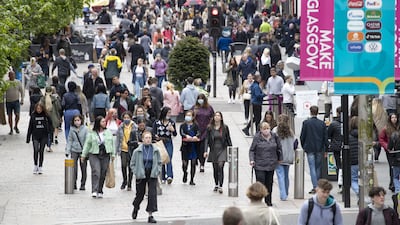Britain’s retail sales recovered in January as shoppers shrugged off rising inflation and the threat from the Omicron variant of coronavirus eased.
The volume of goods sold in stores and online rose 1.9 per cent compared with the same month a year earlier, according to the Office for National Statistics, reclaiming part of the 4 per cent decline seen in December when Covid-19 restrictions were tightened.
The rise in sales was the biggest monthly increase since the shops reopened last spring, with department stores, garden centres and other non-food stores recording particularly robust growth, of 3.4 per cent.
Helen Dickinson, chief executive of the British Retail Consortium, said despite inflation pressures and falling consumer confidence, retail sales held up well in January as retailers went to great lengths to keep up the Christmas momentum.
“Sales of non-food items, including clothing, furniture and household goods all grew by high double digits,” said Ms Dickinson.
“Meanwhile, food sales dropped — though this is compared to January 2021, when most of the country was in lockdown and households were unable to eat out.”
Britain's inflation rate rose to 5.5 per cent in January on the year, taking prices to a fresh 30-year high and pushing living costs up further for households already struggling with higher energy bills and interest rates.
Inflation was up from December's rate of 5.4 per cent, driven by higher clothing and footwear prices, according to the Office for National Statistics, with the Bank of England expecting inflation to hit 7.25 per cent in April — more than triple its 2 per cent target — when a 54 per cent surge in energy bills and higher taxes take effect.
However, despite the threat of rising inflation, and 76 per cent of consumers now saying they are feeling the effects of the cost-of-living squeeze, sales volumes were 3.6 per cent above pre-pandemic levels seen in February 2020.
“Consumers appeared to be shrugging off the mounting cost-of-living crisis and that trend still appears to be continuing for now, with a trip to the shops becoming more popular through February,” said Susannah Streeter, senior investment and markets analyst at Hargreaves Lansdown.
“According to other data from the ONS, in the week to the February 12 overall retail football in the UK increased by 2 per cent from the previous week and was 86 per cent of the level seen in 2019, the fifth consecutive week of increasing retail footfall.”
The figures add to a raft of data that are likely to convince the Bank of England that the UK economy is recovering strongly enough to cope with a third straight interest-rate increase in March.
They also provide some succour for the nation’s beleaguered retailers, who saw a dismal December after households brought forward their festive shopping in fear of further Covid restrictions.
The number of people shopping during Boxing Day sales in London’s West End plummeted last year, as many chose to avoid the city centre amid a surge in cases of the Omicron coronavirus variant in the UK.
Footfall around the shopping destinations of Oxford Street, Regent Street and Bond Street was almost half of pre-pandemic levels on Sunday, the first day after Christmas, when shoppers typically flood the capital on the hunt for bargains.
The upbeat January figures suggest that consumers are starting to look beyond the coronavirus pandemic and returning to a more typical behaviour pattern, said Stuart Cole, chief macroeconomist at stockbroking firm Equiti Capital.
“However, the key issue going forward will be whether this apparent bounce back in consumption will be able to withstand the forthcoming increase in taxation and energy bills set to hit in April, which together will take a significant chunk out of workers' pay packets,” he said.


